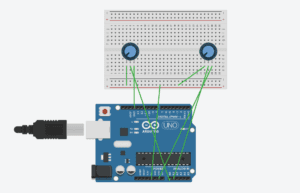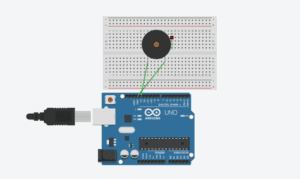import processing.serial.*; String myString = null; Serial myPort; int NUM_OF_VALUES = 2; /** YOU MUST CHANGE THIS ACCORDING TO YOUR PROJECT **/ int[] sensorValues; /** this array stores values from Arduino **/ //int x=sensor1; //int y=sensor2; float newvalue1; float newvalue2; float px; float py; void setup() { size(500, 500); background(0); setupSerial(); } void draw() { px = sensorValues[0]; py = sensorValues[1]; updateSerial(); printArray(sensorValues); newvalue1= map(sensorValues[0], 0, 1023,0, width); newvalue2= map(sensorValues[1], 0, 1023,0, height); ellipse(newvalue1,newvalue2, 100, 100); ellipse(sensorValues[0], sensorValues[1], 100, 100); // use the values like this! sensorValues[0] //stroke(255); //line(newvalue1, newvalue2, px, py); // add your code // } void setupSerial() { printArray(Serial.list()); myPort = new Serial(this, Serial.list()[0], 9600); // WARNING! // You will definitely get an error here. // Change the PORT_INDEX to 0 and try running it again. // And then, check the list of the ports, // find the port "/dev/cu.usbmodem----" or "/dev/tty.usbmodem----" // and replace PORT_INDEX above with the index number of the port. myPort.clear(); // Throw out the first reading, // in case we started reading in the middle of a string from the sender. myString = myPort.readStringUntil( 10 ); // 10 = '\n' Linefeed in ASCII myString = null; sensorValues = new int[NUM_OF_VALUES]; } void updateSerial() { while (myPort.available() > 0) { myString = myPort.readStringUntil( 10 ); // 10 = '\n' Linefeed in ASCII if (myString != null) { String[] serialInArray = split(trim(myString), ","); if (serialInArray.length == NUM_OF_VALUES) { for (int i=0; i<serialInArray.length; i++) { sensorValues[i] = int(serialInArray[i]); } } } } }

import processing.serial.*; String myString = null; Serial myPort; int NUM_OF_VALUES = 2; /** YOU MUST CHANGE THIS ACCORDING TO YOUR PROJECT **/ int[] sensorValues; /** this array stores values from Arduino **/ //int x=sensor1; //int y=sensor2; float newvalue1; float newvalue2; float px; float py; void setup() { size(500, 500); background(0); setupSerial(); } void draw() { px = sensorValues[0]; py = sensorValues[1]; updateSerial(); printArray(sensorValues); newvalue1= map(sensorValues[0], 0, 1023,0, width); newvalue2= map(sensorValues[1], 0, 1023,0, height); //ellipse(newvalue1,newvalue2, 100, 100); //ellipse(sensorValues[0], sensorValues[1], 100, 100); //// use the values like this! // sensorValues[0] stroke(255); line(newvalue1, newvalue2, px, py); // add your code // } void setupSerial() { printArray(Serial.list()); myPort = new Serial(this, Serial.list()[0], 9600); // WARNING! // You will definitely get an error here. // Change the PORT_INDEX to 0 and try running it again. // And then, check the list of the ports, // find the port "/dev/cu.usbmodem----" or "/dev/tty.usbmodem----" // and replace PORT_INDEX above with the index number of the port. myPort.clear(); // Throw out the first reading, // in case we started reading in the middle of a string from the sender. myString = myPort.readStringUntil( 10 ); // 10 = '\n' Linefeed in ASCII myString = null; sensorValues = new int[NUM_OF_VALUES]; } void updateSerial() { while (myPort.available() > 0) { myString = myPort.readStringUntil( 10 ); // 10 = '\n' Linefeed in ASCII if (myString != null) { String[] serialInArray = split(trim(myString), ","); if (serialInArray.length == NUM_OF_VALUES) { for (int i=0; i<serialInArray.length; i++) { sensorValues[i] = int(serialInArray[i]); } } } } }
import processing.serial.*; int NUM_OF_VALUES = 3; /** YOU MUST CHANGE THIS ACCORDING TO YOUR PROJECT **/ Serial myPort; String myString; // This is the array of values you might want to send to Arduino. int values[] = new int[NUM_OF_VALUES]; void setup() { size(500, 500); background(0); printArray(Serial.list()); myPort = new Serial(this, Serial.list()[0], 9600); // check the list of the ports, // find the port "/dev/cu.usbmodem----" or "/dev/tty.usbmodem----" // and replace PORT_INDEX above with the index of the port myPort.clear(); // Throw out the first reading, // in case we started reading in the middle of a string from the sender. myString = myPort.readStringUntil( 10 ); // 10 = '\n' Linefeed in ASCII myString = null; } void draw() { background(0); // changes the values //for (int i=0; i<values.length; i++) { // values[i] = i; /** Feel free to change this!! **/ //} values[0]= mouseX; values[2]= mouseY; if(mousePressed){ values[1]=1; } else{ values[1]=0; } // sends the values to Arduino. sendSerialData(); // This causess the communication to become slow and unstable. // You might want to comment this out when everything is ready. // The parameter 200 is the frequency of echoing. // The higher this number, the slower the program will be // but the higher this number, the more stable it will be. echoSerialData(200); } void sendSerialData() { String data = ""; for (int i=0; i<values.length; i++) { data += values[i]; //if i is less than the index number of the last element in the values array if (i < values.length-1) { data += ","; // add splitter character "," between each values element } //if it is the last element in the values array else { data += "n"; // add the end of data character "n" } } //write to Arduino myPort.write(data); } void echoSerialData(int frequency) { //write character 'e' at the given frequency //to request Arduino to send back the values array if (frameCount % frequency == 0) myPort.write('e'); String incomingBytes = ""; while (myPort.available() > 0) { //add on all the characters received from the Arduino to the incomingBytes string incomingBytes += char(myPort.read()); } //print what Arduino sent back to Processing print( incomingBytes ); }
